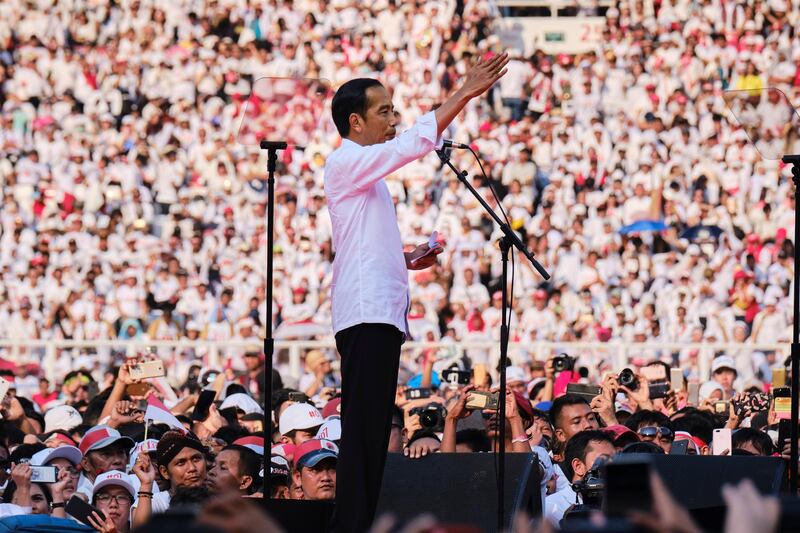On Wednesday Indonesia will stage what is expected to be the biggest one-day election ever, involving, according to the BBC, about 245,000 candidates running for more than 20,000 national and local legislative seats, across a country made up of about 18,000 islands and covering 1.9 million sq km. But by far the most attention is focused on the contest for the presidency. This is essentially a rematch of 2014, with the incumbent Joko Widodo – known as Jokowi – facing off against Prabowo Subianto, an ex-special forces general and a former son-in-law of Suharto, the dictator whose fall, after three decades in office, led to the advent of reform and democracy in the 270 million-strong nation in 1998.
The contrast with Mr Jokowi, a former furniture salesman who became mayor of the city of Solo, then governor of the country's capital, Jakarta, is stark. Coming from neither the political or religious elite, Mr Jokowi had a record of fighting for transparency and challenging corruption and was known for dropping by unannounced to check on city-funded projects. He connected with, and seemed of, the people. Mr Prabowo's campaign, on the other hand, was boosted by his impressive oratory and energy but undoubtedly harked back to the past on the promise of strong – for which read strongman – leadership.
When Mr Jokowi won, he was compared to Barack Obama, who was the same age, had also grown up partly in Indonesia and similarly appeared to represent hope, change and a new politics. Five years on, the shine has almost completely worn off for Mr Jokowi. Human rights activists were disappointed early on when he signed execution orders for eight drug offenders. Progressives' dismay was complete when Mr Jokowi announced his vice presidential running mate – Maruf Amin, one of the country's top clerics and a man who had testified against a former Jakarta governor in a blasphemy trial that many considered politicised and dubious. The governor, Basuki Tjahaja Purnama, was jailed for two years. What made it startling was that Mr Basuki had been Mr Jokowi's deputy when he had been governor.
But the truth is that Mr Jokowi never was any kind of south-east Asian Obama, and it is an error to criticise him for failing to live up to expectations that were wrongly raised in the first place. While he has been a reformer who has placed an emphasis on good and technocratic governance, he has also been cautious and pragmatic. This has been partly out of necessity – he was the candidate of the Indonesian Democratic Party of Struggle (PDI-P), but it was led by former president Megawati Sukarnoputri – and he has also been constrained by having to form wider alliances in the legislature. But his unwillingness to be bolder might be true to his character, in any case. It could also be prudent, as the constituency for a far-reaching liberal agenda is small, not only in Indonesia but also in many of its essentially conservative neighbours – however much international commentators might wish otherwise.
Mr Prabowo has likewise appeared to attract a little less excitement this time round. Although his staff insist that he is closing the gap with Mr Jokowi, he has been consistently about 15 points behind. Some have speculated that he is really in the race to ensure a good showing for his party, Gerindra, in the hope that it can secure some plum jobs when the horse-trading to form a new parliamentary majority takes place.
Both candidates have been criticised for pandering to voters who want a greater emphasis on Islam, in a country with the largest Muslim population in the world. But the desire for leading politicians who are serious about winning office to make an outspoken defence of secularism strikes me as another example of wishful thinking. The wind is in the sails of candidates and parties who burnish their Islamic credentials throughout the region, where there is also a strong trend towards majoritarianism. Nor should that be portrayed as being anti-democratic – especially in Indonesia, where it has been democracy that has allowed conservative Muslims a voice that they were not allowed under Suharto's dictatorship.
Mr Jokowi has a reasonable record in improving infrastructure, keeping the economy growing at more than five per cent, reducing poverty, delivering new services in healthcare and schools and maintaining relatively low inflation. Mr Prabowo says more needs to be done for the poor. His running mate, Sandiaga Uno, is a very successful businessman, who was elected deputy governor of Jakarta in 2017. At 49, he might be positioning himself for a future leadership bid, regardless of whether his team wins the presidency this time or not.
Liberals might not like the direction they perceive the country to be heading in but that is no reason to suggest that Indonesia is in danger of democratic backsliding. Indonesians will be voting for the kind of democracy they want. If liberals don't do well, then they need to fight harder and be more persuasive in future. As for Mr Jokowi, maybe the truth has dawned that he was never one of them in the first place. If he wins again, Indonesia could do far worse than a cautious technocrat who is focused on reflecting the will of the people. The fact that democracy has endured and strengthened since the fall of Suharto should be celebrated – not damned with grave warnings by outsiders, who think the country should follow a path its citizens have not indicated they want.
Sholto Byrnes is a Kuala Lumpur-based commentator and consultant and a corresponding fellow of the Erasmus Forum





